#vol. LIII
Explore tagged Tumblr posts
Text
Mitchellaneous Vol. LIII: Ten things I found on the Internet.

Vincent Price in 1971
Several GIFs from “Back to the Future”
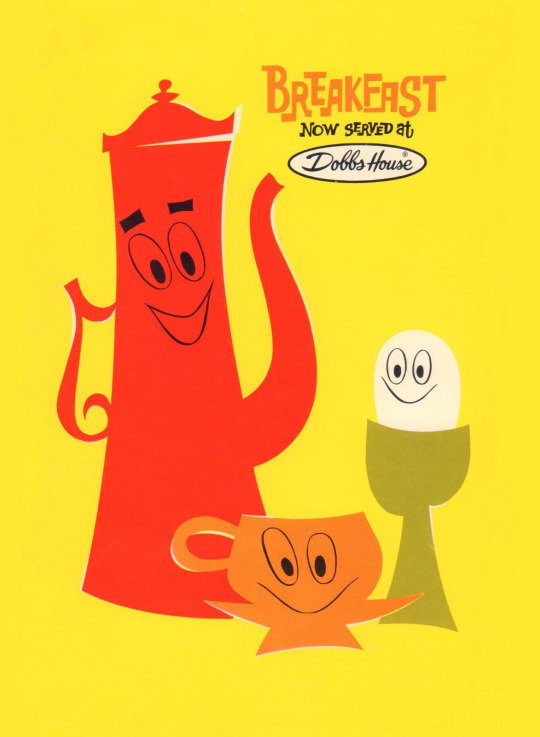
Cover of the breakfast menu at the Dobbs House restaurant (1970).

1959 Philco TV, model B-129.


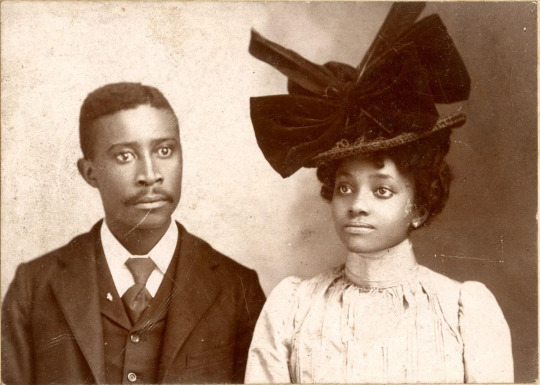

Las Vegas, Fremont & 3rd, April 1967

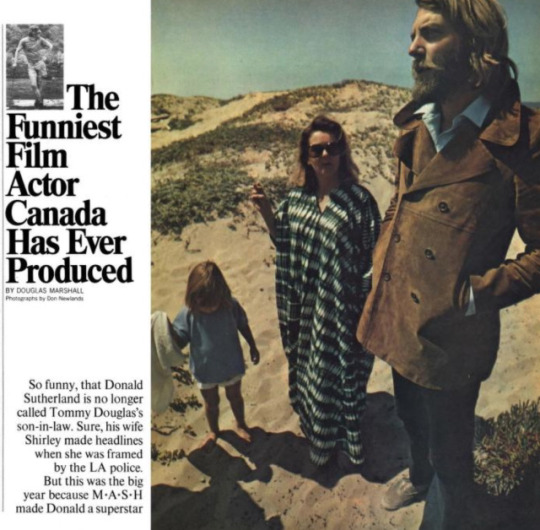

5 notes
·
View notes
Text

“The Sphinx of Power.” Adolf A. Weinman. The Architectural review. Vol. LIII. 1923.
1 note
·
View note
Text
Destiel Chronicles
Vol. LIII
It was a love story from the very beginning.
Because You Cheated On Me
(10x05/10x07)
Hello my friends! Here I'm with another meta from this series.
This time I'm gonna share with you something I discovered in this early season.
I want to say thanks to my dearest friend @agusvedder who made the gifs for this meta. Love ya gorgeous 💕
Wincest: NO! Destiel: ...
Episode 10x05 Fan Fiction was dedicated to the fans. We can see a lot of fan service, (the quote "We have work to do" as the Winchester loved cliche, but it also connects with season 15, in which we heard it again, delivering us a huge parallel with what is going on in the last season, I will talk later of this) but also, we can see Dean's reaction to the ships.

Her is Dean and the audience (mostly GA) who don't see subtext or ships, but is Rejecting it right away. Because they're brothers. And is disgusting to think they're searching for something else between them, so... Dean requested them to get away from each other.
A different reaction we can see I'm Dean )or may I say Jensen?) When Marie suggests DESTIEL ship, and explains the subtext to him.

He doesn't asked to be apart, and one little detail, the two girls were dating in real life (winking at Cockles shippers).

And the precious relevance to SUBTEXT in the show, when we are talking about Dean and Cas.
Dean will end by accepting it, and embracing it...
DEAN : Yeah, that'd have been easier. I know I have expressed some differences of opinion, regarding this particular version of Supernatural. But tonight, it is all about Marie's vision. This is Marie's Supernatural. So, I want you to get out there, and I want you to stand as close as she wants you to, and I want you to put as much sub and add text, as you possibly can. There is no other road. No other way. No day, but today.
Marie's supernatural, the Fan's Supernatural, it transport me to Becky in episode 15x04. Writing her own ending and her own stories...

Marie, not accepting the end Chuck had written, she chooses to write her own ending. And that's, what I think, the huge parallel with season 15.
The Winchesters, TFW 2.0, can write their own ending. Their own destiny.
But don't forget this is a Destiel Meta, and I can't avoid the fact that while Dean was talking about subtext here, he was putting Castiel's tie upside down. That's very meaningful because... Dean knows how Cas wears his tie... And is something he had payed attention... Is part of his Castiel, and maybe something he find adorable on him.
Yes... Subtext...
Another quote that brings us to season 15 is the two girls acting like Sam and Dean, saying...
SIOBHAN!DEAN : You're right, Sammy. Out on the road. Just the two of us.
MARIE!SAM : The two of us against the world.
First episode in season 15, Dean said the same quote. So, there's a tight recalling to this episode, in which Chuck appears at the end too.
The message is... We write our own destiny and ending.
Jealous and Revenge
Now... We all laughed with this scene...

But what this means...?
If you recall the last episode from this season... Sam and Cas team up and Dean didn't know it. They were cheating on Dean. Sastiel and Destiel.
This is not the only clue among the season, and you will discover it with me though these metas.
But now... I want to talk about Castiel's speech from my previous meta : THERE'S A FEMALE ON MY CAR and Dean's puzzled and frowned face... Jealous.
Because... What happened at the beginning of episode 10x07, Girls, Girls, Girls... It has to do with that.
What I call REVENGE from Dean Winchesters feeling himself abandoned and deceived, and cheated by Castiel... Was he with a woman in his car??? What about me? Does he changed me for her?
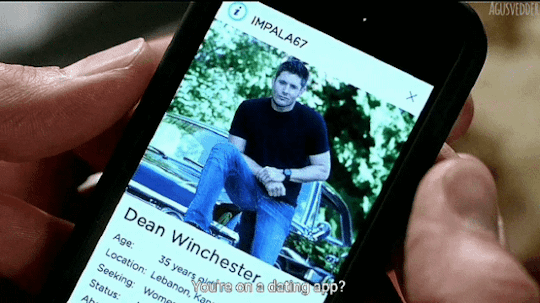
So... Very OOC... Dean Winchester tried to hook up with a date app...
SAM: Shaylene, huh?
Dean, there are like a million messages here.
DEAN: Yeah, uh, check out her pic.
SAM: Uh...Oh. Wow. Okay.
[Camera view of phone shows a beautiful woman with dark hair in a blue dress]
Um, okay. She's hot. But...
DEAN: "But," what?
SAM: But she seems, um... Kind of...available. Like too available. "Oh, baby, whatever you want. I'm burning up just thinking about you."
Okay, if you rewatch the whole scene, Sam is mocking him, because is clear here Dean doesn't use to do this. Dean doesn't use date apps to get a woman. Then, why is he doing this?
Because he is acting now like a jiltter lover (oh, wait... Is another parallel with Human!Cas in episode 9x06 😏)
And because the subtext has to be well constructed here, it jumps to Cas and Hannah (the female in Castiel's car) doing this...
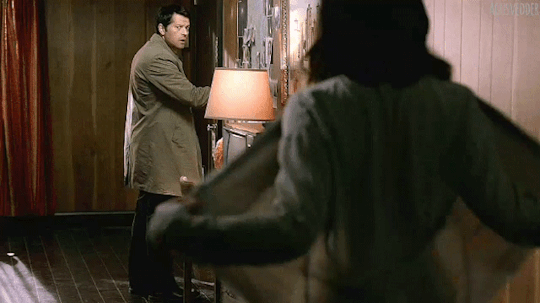
Is she "Kind of avaible. Like too avaible?"
Yes she is...
And because this season we will talk about romantic betrayal (CAS cheating on Dean with Hannah and Sam) we have a foreshadow with Hannah's vessel and the husband.

And Castiel excusing Hannah's behavior... Because...
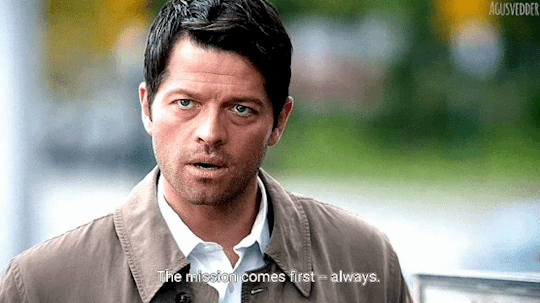
The mission comes first DEAN WINCHESTER COMES FIRST, will echoing one of the quotes by the end of the season in which Sam, Cas and Charlie will do anything to save him from the mark, even if that means not telling him (cheating on him) FOR DEAN.
To Conclude:
Episode 5x05 brings us to season 15 and Chuck's drama. TFW must learn they can write their own destiny and ending.
Dean using a dates app is so ooc that hurts, but it has his cause on Castiel's female in his car, so Dean is absolutely acting like a jitter lover.
Foreshadowing too the Sastiel team, hiding Dean his plans to save him.
Hope you like this meta, see you in the next one!
Tagging @metafest @magnificent-winged-beast @emblue-sparks @weirddorkylittlediana @michyribeiro @whyjm @legendary-destiel @a-bit-of-influence @thatwitchydestielfan @misha-moose-dean-burger-lover @lykanyouko @evvvissticante @savannadarkbaby @dea-stiel @poorreputation @bre95611 @thewolfathedoor @charlottemanchmal @neii3n @deathswaywardson @followyourenergy @dean-is-bi-till-i-die @hekatelilith-blog @avidbkwrm @anarchiana @dickpuncher365 @vampyrosa @foxyroxe-art @authorsararayne @anonymoustitans @mybonsai1976 @love-neve-dies @wildligia @dustythewind @wayward-winchester67 @angelwithashotgunandtrenchcoat @trashblackrainbow @deeutdutdutdoh @destiel-is--endgame @destiel-shipper-11 @larrem88 @charmedbycastiel @ran-savant @little-crazy-misha-minion @samoosetheshipper
@shadows-and-padlocked-hearts @mishtho @dancingtuesdaymorning @nerditoutwithbooks @mikennacac73 @justmeand-myinsight @idontwantpeopletoknowmyname @tenshilover20 @teddybeardoctor @pepevons @helevetica @isthisdestiel @dizzypinwheel @jawnlockwinchester @horsez2 @qanelyytha
@imjustkipping @shippsblog
If you want to be added or removed from this list, just let me know.
If you want to read the previous metas From season 10, here you have the links...
Vol. LI and Vol. LII
Buenos Aires, March 15 2020 03:04 PM
60 notes
·
View notes
Text
BTS as Florida man headlines master post
The OP that inspired it all
Vol I Vol XXVI Vol LI Vol II Vol XXVII Vol LII Vol III Vol XXVIII Vol LIII Vol IV Vol XXIX Vol LIV Vol V Vol XXX Vol LV Vol VI Vol XXXI Vol LVI Vol VII Vol XXXII Vol LVII Vol VIII Vol XXXIII Vol LVIII Vol IX Vol XXXIV Vol LIX Vol X Vol XXXV Vol XI Vol XXXVI Vol XII Vol XXXVII Vol XIII Vol XXXVIII Vol XIV Vol XXXIX Vol XV Vol XL Vol XVI Vol XLI Vol XVII Vol XLII Vol XVIII Vol XLIII Vol XIX Vol XLIV Vol XX Vol XLV Vol XXI Vol XLVI Vol XXII Vol XLVII Vol XXIII Vol XLVIII Vol XXIV Vol XLIX Vol XXV Vol L
BTS as Florida man: A Christmas Special
Kim Namjoon as Florida man
BTS as Florida man: Wholesome edition
#bts as florida man#tfw you started with roman numerals thinking you weren't going to make that many posts and now here we are ;.;
274 notes
·
View notes
Text
Fuck it im still awake might as well post my listening notes. Excuse...everything i literally typed these as I listened so its all nonsense. Skipped Lights Up/Adore You/WS as i need to get my ass to bed. Gnight
Fine Line First Listen
Golden: love that piano!! I expected it to be way lighter and sunnier in tone based on how harry and zane described it. I like this a lot more than expected based on description. like way more. so melancholy yes ty v good v golden
Cherry: this is going to sound weird but the effect on his voice reminds me of like...2008. In the way that it reminds me of that era of indie vocals and production. I hear the Bon Iver comparisons here. Like V Bon Iver/Antlers/The Dodos etc. Was unsure at first but rly like this song
Falling: Not wild about the melody on this one. Feels norm. Vocals at the end of the chorus (“Fa-ah-liIiing”) sounds real good. Also love the phrasing in verse 2. He’ll sound good singing this live. My least fave on the album so far.
To Be So Lonely: uh excuse me? This guitar is cool as shit. And the melody yes pls. These are my fave lyrics on the album so far for sure. Very clever turns of phrase that sound great when they’re sung, the sort of thing I always felt Harry had in him based on his witty personality an dlove of a clever line. This production is so unexpected I absolutely love this.
She: ohhhh ok BITCH. All of the piano on this album is absolutely doing it for me. OH FUCK YEAH AT THIS CHORUS. Full here for the extended guitar solo outro. I LOOOOOOOVE THIS SONG. Rly like the lyrics here too. I hadn’t heard any growth on the 3 released songs but I’m seeing some interesting movement in the second half of the album. Immediate stand out from the non pre-leased songs. The Woman of Fine Line. Also funny enough this song reminds me a bit of Jenny Lewis. Not a ton, just a bit in the songwriting.
Sunflower, Vol 6: oh ok into this rhythm. This vibe is cool as hell - need to spend more time with it im a little tired and distracted rn and there’s so much going on here. Besides the older influences it also comes across with touches of Grizzly Bear and earlier Vampire Weekend. Love these lyrics:
I couldn't want you any more
Kiss in the kitchen like it's a dance floor
I couldn't want you any more
Kids in the kitchen, listen to dancehall
Canyon Moon: this is the first song where the influence feels thick and in that way reminds me more of the self titled. Dont dislike it but again need more time with this one to feel it my thoughts.
TPWK: ok plot twist. I think i love this kooky shit? Also the lyrics are like...slightly desperate like they’re convincing the writer/listener that they can feel good if they try as hard as the production is trying, that its something to work toward rather than something that comes naturally the way the song makes it sound? Idk thats probably all nonsense just my first impression. Interesting to compare it to LIghts Up they are so different sound wisde but serve similar functions i think. This is like harry’s I Know A Place.
Giving second chances
I don't need all the answers
Feeling good in my skin
I just keep on dancin'
Lovely.
Fine Line: ok yes i hear the bon iver fully now clearly lol. Love these lyrics, seems clear he’s speaking to himself here. Glad im listening to this on headphones. This is gorgeous i absolutely love it, feeling a bit emosh lol lets pretend i did not say that but wow i rly am. Cathartic, i love a good build up. Absolutely a stand out and perfect closer. Wonderful.
Overall impression: on first listen i think this is a gorgeous album and i immediately feel it’s stronger than the first album, no question in my mind. A lot brighter than i expected based on his descriptions. It builds a lot on what the first album laid out. I think it succeeds more on being as varied as s/t in terms of influence but feels more cohesive and like there’s a point of view that I think was missing a bit in HS1. It sounds like he has more to say and says it in more interesting ways (sonically, lyrically)
I think the production is in full force here, making for a great album to listen to, but it comes at the expense of major vocal moments for Harry. There are obvious moments of cool phrasing but overall thats not the focus here. It isn’t a bad thing for the album as a piece of work but as a stan of harry’s voice I’m disappointed in that regard. Not many disappointments here tho I’m wild about it. Again, just like the first album so much of it feels unexpected and it rly excites me to listen to it. I can’t wait to dig in more.
Can’t say I have many complaints. Need to give more time to Canyon Moon. Falling didn’t connect with me; something about the songwriting here felt undercooked rather than stripped back (even tho i did like some of the vocal choices). But otherwise immediately was digging everything to varying degrees. Fully obsessed with Golden, SHE biiiiiitch, To Be So Lonely, Fine Line. Really liked the others, even TPWK I think?!?? What a weirdo song but i like?
THANK YOU HARRY FOR THIS GOOD ASS MUSIC ILU.
18 notes
·
View notes
Link

#drone#Drone Laws in India#Drone Regulations in India#Drones in India#Drone safety rules#The Drone Rules#Drone Regulations#Drone Laws Rules and Regulations#Unmanned Aircraft Systems
0 notes
Text
SLIPTRICK RECORDS Awesome Mix Vol LIII â Free Download
SLIPTRICK RECORDS Awesome Mix Vol LIII â Free Download
SLIPTRICK RECORDS – Awesome Mix Vol LIII Download Cost – â¬0.00 01. Imari Tones â Crucified Boy 02. Krilloan â Yggdrasil 03. Leslie Ripp â Kingdom Crom 04. Spektrvm â Rainfire 05. Steel Cage â Humanity Threshold Available for a limited time only! 5 tracks at 320 kbps. Download the package for free! Available now, only at Shop Sliptrick Sliptrick Records â Awesome Mix Every so often,…

View On WordPress
0 notes
Text
Aforismos
1.
El espiritual no es un hippie, más bien es un héroe.
2.
Ya es hora de aceptar que mi subjetividad plena y poderosa va a ser rechazada de muchos rincones. Pero ¿qué más da? ¡Dioniso exige respeto!
3.
Yo te guardo respeto, Katï, pero quiero que si en algún momento sentís que intento sugestionarte, saltes con toda tu ira sobre mi yugular, para que pueda probar un poco de tu veneno.
4.
No tengo que preocuparme de sentir grandes emociones negativas ¡Más bien alentarme! Pues, todo encuentra su opuesto complementario y, como ya se dijo, es una antesala a cualquier crecimiento.
5.
Ni uno ni otro
“Por encima de las cabezas irreflexivas de la «compañía presente» recurrimos a la «gran compañía de las personas reflexivas» en las que [la conducta] pudiera situarse en el espacio o en el tiempo.”
-J. N. Findlay, «Morality by Convention», en Mind, vol. LIII, pág. 16.
6.
Para aceptar mi cintura, mis caderas -¡sí, esa palabra que no me gusta mencionar!-, debo aceptar la síntesis que el reptil en mí devela: ya soy bastante hombre, ahora debo ser mujer y aceptar la feminidad, la Vagina, la pasividad. Allí voy a encontrar poder
7.
«Si en la conversación vos estás de acuerdo conmigo en algún punto, este punto habrá quedado ya suficientemente probado por mí y por vos, y ya no será preciso someterlo a otra prueba. En efecto, jamás lo aceptarías; ni por falta de sabiduría, ni porque sentís excesiva vergüenza, ni tampoco lo aceptarías intentando engañarme, pues sos amigo mío, como vos mismo decís. Por consiguiente, la conformidad de mi opinión con la tuya será ya, realmente, la consumación de la verdad.»
-Platón, Georgias, 487d-e.
8.
¡Erasmo nació el mismo día que yo!
Y, además










Aforismos was originally published on El Satiro
5 notes
·
View notes
Photo
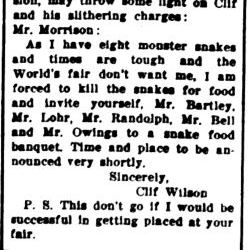
August 2, 1934; St. Charles Chronicle Vol LIII, No. 15, p. 5
[image caption: Will Eat Snakes if Fair Doesn’t Want ‘Em Chicago. - Last year one Clif Wilson ran a snake show on the Midway, at A Century of Progress, where the Street of Villages is now located. Little has been heard about Clif since the 1933 World’s fair closed, but the following telegram addressed to Jack Morrison, of the exposition’s publicity division, may throw some light on Clif and his slithering charges: Mr. Morrison: As I have eight monster snakes and times are tough and the World’s fair don’t want me, I am forced to kill the snakes for food and invite yourself, Mr. Bartley, Mr. Lohr, Mr. Randolph, Mr. Bell and Mr. Owings to a snake food banquet. Time and place to be announced very shortly. Sincerely, Clif Wilson P.S. This don’t go if I would be successful in getting placed at your fair.]
#history#Chicago World's Fair#old news articles#snakes#people being Extra#the things you find when you're searching thru microfilm for someone's obituary...#St. Charles Chronicle#cw: snakes#cw: implied animal death#(I guess?)#tbh one of the best things about being a reference librarian is finding weird stuff like this
1 note
·
View note
Text
A NEW BIBLE
From LIGHT (A Journal of Psychical, Occult, and Mystical Research)
NO. 2759. VOL. LIII. FRIDAY, NOVEMBER 24, 1933
LETTERS TO THE EDITOR
A DOUBLE INTRODUCTION
Sir, -- About this time last year, just at the close of a sitting, the Control asked me if I would make a point of visiting a Dr. R. who was now house-ridden, cut off from his accustomed intellectual companionship and often very lonely. “He is all right at the moment because he has got an interesting MS. to read. This is the work of a lady who is permitted to come over here and read some of our books taking back with her a memory of what she has read which is then put into writing. Buy the book when it is published. Her name is Marjorie Livingston. Go and have tea with the old Doctor.”
When the Medium came out of trance, I asked if she knew a Dr. R. ----. She did, and was going to sit with him in two days.
I wrote to the Doctor, giving a detailed account of my sitting, saying he, alone, could vouch for the facts, and asking if I might have tea with him on the following Wednesday.
This letter I sent to the Medium asking her to forward it, as I preferred to remain in ignorance of the address.
The reply came. Everything was verified. I Went to tea with this new friend, of whom I knew nothing about until the introduction was made through a discarnate entity.
I made a slight mistake in the spelling of the name which I rendered (as I had received it) phonetically.
Until I met Dr. R., I did not know Marjorie Livingston had already written on psychic matters. She, too, was a complete stranger to me of whom I had not even heard.
FLORENCE HODGKIN
NO. 2760. VOL. LIII. FRIDAY, DECEMBER 1, 1933
SPIRIT WORLD LIBRARIES
THE STRANGE STORY OF MRS. MARJORIE LIVINGSTON
In a letter to the Editor (Nov. 24th) a correspondent of LIGHT told the story of a spirit communication which she received concerning Marjorie Livingston, of whom she never heard before. The communicator referred to Mrs. Livingston as a lady “who is permitted to come over here and read some of our books, taking back with her a memory of what she has read, which is then put into writing.”
In an interview given to LIGHT Mrs. Livingston kindly elaborated this message in the following words:
“Everything has its counterpart in the astral. Every book which is above gross ideas of matter has a counterpart in the astral libraries. The type of the book determines the plane on which it will be preserved. THE NEW NUCTEMERON, my first book, I am told, exists in the astral libraries in a much finer form than the earthly copy. All the works of Apollonius of Tyana are in those libraries, Spirit-books, too. When we go over ourselves we should be able to write books and get them into libraries. They again would have their counterpart on a still higher plane. No knowledge is ever lost.”
What is the difference between such spirit libraries and the Akashic Records? we asked.
“I suppose the libraries are part and parcel of them. The Akashic Records take various forms. The lowest form is the physical book on the earth. There is an imperishable part in them: the idea. Ideation comes first, form afterwards.”
How do you read these books?
“Most of my experiences begin in the waking state. I deliberately give myself the idea of leaving the earth, or if rising from it. Then I reach a garden and go through it to the Temple of Truth, which stands upon one of the outer spheres of our planet, and I am met there by one of the Hierophants who takes me to the Hall of Learners my. There I am actually shown a book laid on a lectern, and told to study it. I remember nothing more then until I find myself back. In sleep I have the consciousness of going there again. But no memory of what I read. When, however, I begin to write, the whole thing becomes alive in my mind. Thus I know what I have been studying. I could not have written the OUTLINE OF EXISTENCE otherwise for I did not choose the subject of its chapters and did not read them up.”
And your clairaudience experiences?
“All my previous books were clairaudience received. I become conscious simultaneously on all mental planes. I heard THE ELEMENTS OF HEAVEN dictated word by word. I only copied it. Sometimes I received 150 words before there came a pause. In THE NEW NUCTEMERON and THE HARMONY OF THE SPHERES the method was of memory clairaudience. That is, while I was writing them I heard the words echoing in my brain as if I had heard them before.”
NO. 2762. VOL. LIII. FRIDAY, DECEMBER 15, 1933
ASTRAL LIBRARIES
MRS. MARJORIE LIVINGSTON'S OTHER-WORLD ACTIVITIES
It will be recalled that in our issue of November 24th, Mrs. Florence Hodgkin, of Reading, told how, in a communication from the “other side” through a trance Medium, she was informed that Mrs. Marjorie Livingston (of whom she had not heard previously) was “permitted to come over here and read some of our books, taking back with her a memory of what she has read, which is then put into writing.”
On her attention being drawn to this, Mrs. Livingston confirmed the statement and added some interesting details regarding the Astral Libraries.
Following the publication of this information (LIGHT December 1st), Mrs. Hodgkin wrote expressing pleasure at the reliability of the communication being thus established and added:
“I received a far more detailed account of Mrs. Marjorie Livingston's activities than my former reference allowed me to relate. For instance, I was told she is at work on the Bible - not as we know it but as it should be, and as it is in the copy she is allowed to investigate. An example of the difference was given to me, and if she is able to sustain the quality and significance of that fragment, then never, surely, will the literary world have received such a 'best-seller’. I am inclined to believe, after reading your article, that this may be news even to Mrs. Marjorie Livingston herself, whom I have never met.”
This letter we forwarded to Mrs. Livingston who, in reply, wrote:
“The note from Mrs. Hodgkin is wonderfully interesting. It gives me a specific example of internal evidence which is so valuable. The Book which I mentioned as being shown to me in the Hall of Learning was a Bible, though 'not like ours’ as Mrs. Hodgkin says. I never mentioned this fact to a living soul, so it was extremely evidential that it should have been given to me in this way.
“The external evidence is weakened by the fact that the Medium knew my name and had met me some long time ago when I once sat with her, but I never think, personally, that external evidence should be over-valued in these matters: it is like trying to weigh gold-leaf on the luggage machine in a goods’ yard! It is the internal evidence which is of true value to those concerned.
“I am very grateful to you for setting this correspondence in motion, for it is so heartening and encouraging to get proof of the accuracy of one's work and messages in this so-called miraculous manner.”
#marjorie livingston#apollonius the tyanaean#apollonius of tyana#apollonius#spiritualism#florence hodgkin
0 notes
Photo
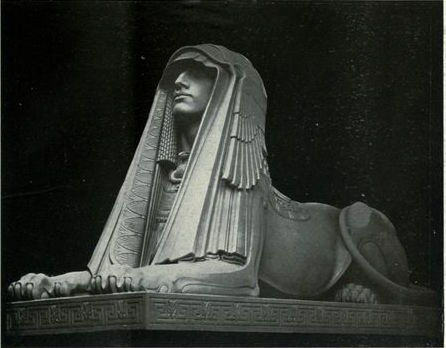
“The Sphinx of Power.” Adolf A. Weinman. The Architectural review. Vol. LIII. 1923.
3K notes
·
View notes
Text
American Football Super Ball Flyer vol.11
See on Scoop.it - vevotpl.com
American Football Super Ball Flyer vol.11 “American Football Super Ball Flyer vol.11” for advertising American football tournaments, matches, events and everything related to it or for any other sport party in your bar/pub/club. Files are structured in folders for easy editing. Change text, edit colors, move items, turn/off layers creating tons off different looks. All text styles are included. Main title (numbers “LIII”) is a 3D rendering and not editable. The above images used all included in the download. Contents: – 1 labeled .psd file – 1 readme .txt file The PSD files is setup at 14,8 cm width x 21 cm height (5.83×8.27”, A5, 1819×2551px), with 0,3 cm bleeds at each border. Print ready: PSD layered, CMYK, 300 DPI. In
0 notes
Text
米国入国税関取締局(ICE) vol.3 商標_動画
1.Superbowl LIII: Intellectual Property Rights Press Conference, 24:00
[コメント] 全米注目のスーパーボール53ですが、ゲームに先立って偽チケットを買わないように、偽ブランド品を買わないようにとのプレスコンファレンスです。ICE、CPB、HSI、FBIの各組織が一丸となって知的財産犯罪に当たっています。
View On WordPress
0 notes
Text
Destiel Chronicles
Vol. LX
It was a love story from the very beginning.
Cain's Mark vs Profound Bond (Part. III)
(10x20/10x21)
Hello my friends! I'm here with the third part of this meta, and we will be close to the end!
I will talk about episode 20 and 21, and how they showed a lot of hints of foreshadow, anticipating the season ending and the beginning of season 11.
Let's start!
What your heart really wants
Episode 10x20 Angel's heart, starts with a desire coming from a heart that belongs to a woman that was separated from her lover: Amelia and Jimmy Novak, and their fake encounter in Amelia's drama induced by a Grigori.
The Grigori fed with human's soul, by putting them into a dream. Just like the djin.
Two facts to describe here:
1) We were talking in previous episodes about what Dean really wants. We had him confessing he wanted to explore these new feelings about people (we know it was Cas), trying to imagine his retirement in the beach, and now we had this scene... A woman trying to find the love of his life. Dreaming with find him. The perfect manifestation from her desires. And we know the episode will end with Jimmy and Amelia together in Heaven. So, what Amelia really wanted was to find his husband. Again they're showing us what a heart really wants linked to a romantic situation.
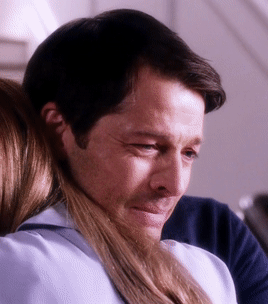
Gif credit @mad-as-a-box-of-frogs
And the episode is called angel's heart, leasing us to Castiel's pure heart, and making us think what he really wants too. He wants to recover Dean from the Mark.
2) Having the Grigori feeding with himan's souls, is a blatant foreshadow of Amara feeding with souls in season 11.
Married
Keeping the Jimmy/Amelia and Destiel parallel and mirror. We had a very married situation when Castiel and Dean came back from interrogatory, and went together to buy a birthday gift for Claire.
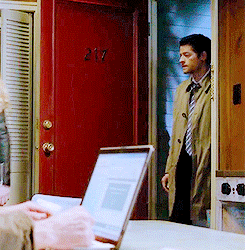
Gif credit @hallowedbecastiel
There's a little moment in which Cas confessed to Claire where he had bought the gift, and Sam turns to see Dean, with a face that tells DID YOU GO TO BUY IT TOGETHER? And is just hilarious.

Gif credit @mad-as-a-box-of-frogs
Another married scene was when Cas scolds Claire and Dean. It was just a very domestic situation in which the daughter and the husband received vituperation.

Gif credit @mad-as-a-box-of-frogs
It was so sweet when Claire asks Dean to take care of Castiel...
CLAIRE: Will you keep an eye on him?
(Dean and Claire look over at Castiel who is talking with Sam) He's been through enough.

Gif credit @mad-as-a-box-of-frogs
Okay, this has such a beautiful meaning, and screams foreshadow too, because Claire knows how had was to Cas everything that happened to her and her family, but she also knows about Castiel being a human. And she sees him as a protector who needs to be protected too. And she, as a protector, feels identified with Dean's profile. Then, she knows Dean is like her. So she trust Dean to take care of the angel.
But Dean replied "SO HAVE YOU" , as a recall of himself.
There's a song playing talking about blue eyes crying in the rain, and meet that loved person again. It could fit with Claire, it could fit with Jimmy, but, if we take the quote YOU KEEP AN EYE ON HIM, knowing that Castiel will be possessed by Lucifer in season 11, and Dean will say I WAS JUST A WITNESS, we could speak about a LOVERS SEPARATION, thanks to Lucifer intrusion, and those blue eyes crying in the rain coul for perfectly with Castiel's depression, causing his YES to Lucy, and Dean could be that one longing for find him again, just like the song says.
The Betrayal
In episode 10x21 "Dark Dynasty" Dean finds out about Castiel and Sam's "affair".
This is a very sad episode, because Charlie dies. In a very bloody picture...
But let's talk about the "affaire"... Watch this dialogue...
DEAN: Wow.
SAM: Hey.
DEAN: Well, you look like crap on toast.
SAM: I just haven't . . . really been sleeping well.
DEAN: There's a woman you haven't mentioned?
SAM: A woman?
DEAN: Well, I'm just saying. You weren't here when I went to bed last night. You've been running off on your own a lot these past couple weeks.
And then... The weird call...
DEAN: Cas?
CASTIEL: Sam.
DEAN: No, it's Dean. What's up?
CASTIEL: Nothing. I'm just, uh . . . Just staying in touch. Like I do.
DEAN: Something on your mind?
CAS: No. This call is pointless. My ride's here. (Cas hangs up on Dean.)


Gif set credit @pinkman
Even Cas mistook Dean with Sam. Sastiel?
And the foreshadow I picked up at the beginning of this season...
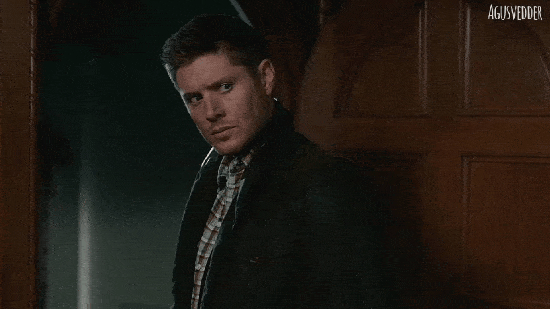
Gif credit @agusvedder
So Yes, he caught Cas' and Sam cheating on him.
And then this scene, showing us Dean is about to find out...
ELDON: Were you here when I mentioned that we're underground? There are secrets.
DEAN: Well, I'm swell at uncovering secrets.
Pointing us he is good at uncovering secrets, and Cas and Sam working at his back, is like a red alert about to sound.
Finally, there were little quotes talking about the balance and disaster that should been repaired. As a premonition of CHUCK/AMARA LIGHT/DARKNESS YING/YANG. Balance. And of course, erasing the mark will release the darkness, and somehow the brothers will have to fix it.
To Conclude:
Both episode gave clues about the incoming season. The Mark of Cain vs what Dean really wants in his heart continues his inner war, showing us through different episodes that Dean wants, deep inside, explore the love he has inside for Castiel, and a better ending.
Charlie's death will release the monster inside of Dean, and we will have a lot of angsty situations (mostly Destiel) to talk about in the next and last chronicle from season 10.
I hope you like this one. See you soon!
Tagging @metafest @magnificent-winged-beast @emblue-sparks @weirddorkylittlediana @michyribeiro @whyjm @legendary-destiel @a-bit-of-influence @thatwitchydestielfan @misha-moose-dean-burger-lover @lykanyouko @evvvissticante @savannadarkbaby @dea-stiel @poorreputation @bre95611 @thewolfathedoor @charlottemanchmal @neii3n @deathswaywardson @followyourenergy @dean-is-bi-till-i-die @hekatelilith-blog @avidbkwrm @anarchiana @dickpuncher365 @vampyrosa @foxyroxe-art @authorsararayne @anonymoustitans @mybonsai1976 @love-neve-dies @wildligia @dustythewind @wayward-winchester67 @angelwithashotgunandtrenchcoat @trashblackrainbow @deeutdutdutdoh @destiel-is--endgame @destiel-shipper-11 @larrem88 @charmedbycastiel @ran-savant @little-crazy-misha-minion @samoosetheshipper
@shadows-and-padlocked-hearts @mishtho @dancingtuesdaymorning @nerditoutwithbooks @mikennacac73 @justmeand-myinsight @idontwantpeopletoknowmyname @tenshilover20 @teddybeardoctor @pepevons @helevetica @isthisdestiel @dizzypinwheel @jawnlockwinchester @horsez2 @qanelyytha
@imjustkipping @destielle
If you want to be added or removed from this list, just let me know.
If you want to read the previous meta about season 10 here you have the links...
Vol. LI, LII, LIII, LIV, LV, LVI, LVII,LVIII, and LIX
Buenos Aires, May 5th 2020 8:46 PM
86 notes
·
View notes
Text
Some Carl Jung Quotation LIII
Some Carl Jung Quotation LIII
I have plumb forgotten my Greek as I have to read mainly Latin texts, Greek ones being something of a rarity in alchemy. ~Carl Jung, Letters Vol. I, Pages 305-306
Kant’s categorical imperative is of course a philosophical touching up of a psychic fact which, as you have quite correctly seen, is unquestionably a manifestation of the anima. ~Carl Jung, Letters Vol. I, Pages 305-306
A complete…
View On WordPress
0 notes
